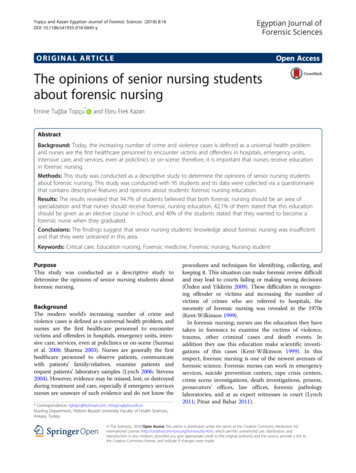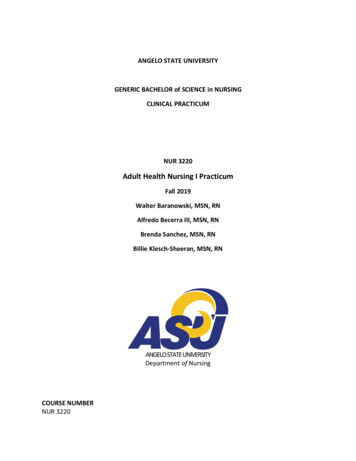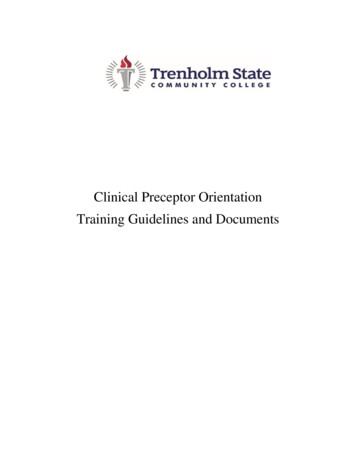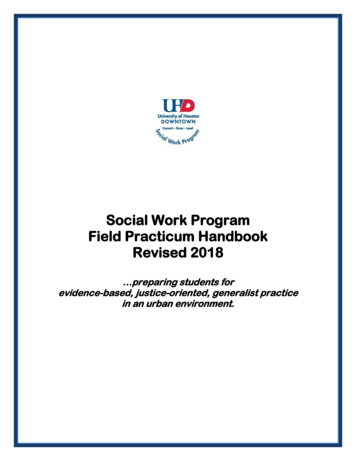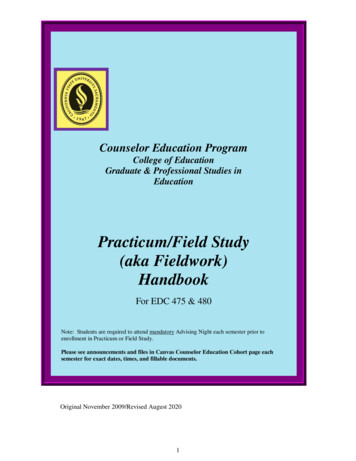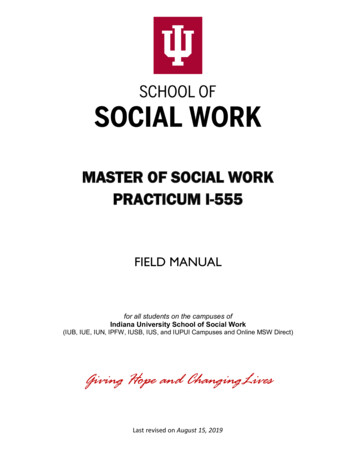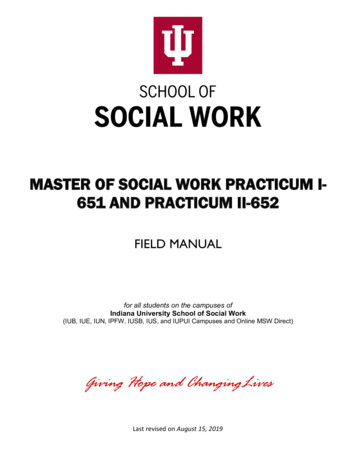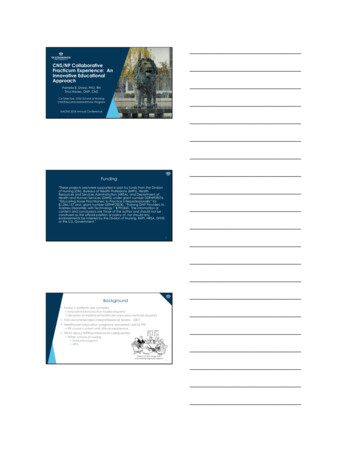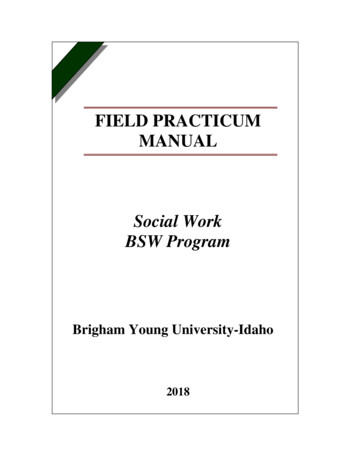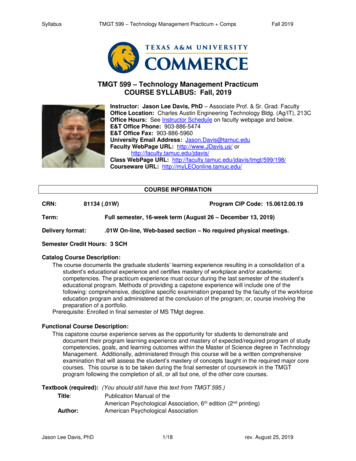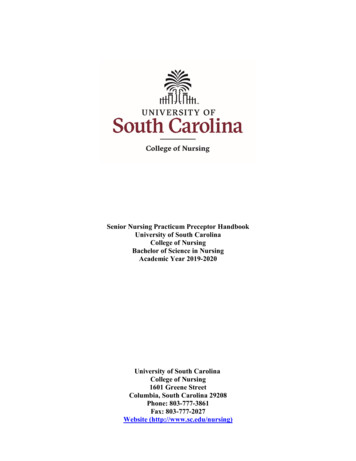
Transcription
Senior Nursing Practicum Preceptor HandbookUniversity of South CarolinaCollege of NursingBachelor of Science in NursingAcademic Year 2019-2020University of South CarolinaCollege of Nursing1601 Greene StreetColumbia, South Carolina 29208Phone: 803-777-3861Fax: 803-777-2027Website (http://www.sc.edu/nursing)
Dear USC College of Nursing Preceptor,Thank you for agreeing to serve as a clinical preceptor to a senior level nursing student from the University ofSouth Carolina College of Nursing. This program would not be successful without your commitment andinvestment of time, wisdom and energy to the clinical learning of our students. The students will benefit fromthe sharing of your experiences and expertise in practical, real world specialty practice, allowing them to trynew skills while gaining confidence and validation. Your willingness to contribute to their clinical learning isan essential part of their academic paradigm and reflects your collegiality and professional commitment to thenursing profession.Preceptorship is a one-to-one relationship between the expert nurse to a nursing student in order to produce highquality, competent nurses in a specialty area of practice. Preceptors guide, direct, and challenge students whileserving as a role model, facilitator, and support system. The nursing faculty and clinical preceptors work as acollaborative team to promote attainment of course outcomes and student learning objectives.As a preceptor, you are the key to successful learning experiences for students as they transition from student toprofessional nurse. The clinical faculty member will assure that ongoing communication occurs betweenfaculty, preceptor and student through site visits to the clinical facility to discuss student progression, preceptorconsultation, and phone or email correspondences. Faculty is always available to preceptors and students byphone. Please feel free to contact faculty to offer input at any time.Again, thank you for your time and commitment as we work together to educate our future nurse leaders andtransform the profession of nursing. Please do not hesitate to contact us for any additional questions orconcerns.Sincerely,University of South CarolinaCollege of NursingSenior Nursing Capstone Clinical CoordinatorDeveloped by Karen Worthy 1/18; Rev 8/18, 1/19, 8/192
SENIOR NURSING PRACTICUM FACULTYThe Capstone Clinical Course Coordinator will send preceptors information with the specifics of the course,required clinical hours, and contact information. The Clinical Course Coordinator bears overall responsibility forthe selection, coordination, and evaluation of the appropriateness of the agency to meet student objectives. Eachstudent in the course is assigned a Capstone Clinical Faculty Advisor who will be in contact with the preceptor toprovide individual contact information.Developed by Karen Worthy 1/18; Rev 8/18, 1/19, 8/193
TABLE OF CONTENTSCover Page .1College Contact .2Preceptor Letter .3Faculty Contact .4Table of Content .5THE COLLEGEAbout the Preceptor Handbook.7Introduction .8Mission, Vision, and Values .9BSN Upper Division Curriculum.10OUTCOMES, PRACTICUUM, AND QUALIFICATIONSBSN Program Outcomes .11Senior Nursing Capstone Practicum .11Clinical Requirements .12Qualifications of Preceptor .13ROLES AND RESPONSIBILITIESPreceptor .14Student .15Faculty.16PRECEPTOR RESOURCESPhases of Preceptor-Student Relationship .17Benefits to Preceptor .19Teaching Strategies in the Clinical Area .19Benner’s Novice to Expert Model .20Characteristics of Effective Preceptor .21Tips From Expert Preceptors .224 E’s of Constructive Criticism.25Methods of Conflict Resolution .26Dealing with Challenging Preceptee .27Preceptor Stress Reduction .28Reframing Constructive Criticism (QSEN) .29Legal Consideration of Being a Preceptor .31Chronology of Student Progression .34CLINICAL POLICIES AND PROCEDURESGuidelines for Scheduling Clinical .37General Guidelines.38Attendance Policy .39Student Not Prepared or Needs Remediation .39Unsatisfactory Clinical Performances and Examples .39Illness or Injury .40Developed by Karen Worthy 1/18; Rev 8/18, 1/19, 8/194
Incident/Occurrence Reports .40Preceptor Ill or Low Census .40Student Absence.40Dress Code .40Important Contact Information .42References .43List of Appendices .44A. NURS 435 Clinical Evaluation .45B. Bloodborne Pathogens Exposure Protocol.47Developed by Karen Worthy 1/18; Rev 8/18, 1/19, 8/195
THE COLLEGEPRECEPTOR HANDBOOKThe College of Nursing Senior Nursing Capstone Practicum Course provides supportive, faculty-supervisedclinical learning experiences designed to emphasize physiological and psychosocial concepts of caring forcomplex clients in a variety of settings across the healthcare continuum. This Handbook establishes the Collegeof Nursing guidelines for using qualified nurses as preceptors to assist with clinical instructions in a variety ofhealth care delivery settings. For the purpose of this Handbook, a “preceptor’ is defined as a registered nurseemployee of a healthcare agency, who agrees to serve as a role model, teacher, and clinical expert directingsenior BSN student learning experiences in the clinical setting. The purpose of the preceptor and facultyclinical arrangement is to provide a one-to-one relationship between an experienced registered nurse and anursing student through valuable experiences in a specific area of practice. The faculty member and preceptorplans clinical activities to meet the learning needs and objectives of the students as related to the courseoutcomes.This document defines the roles and responsibilities of preceptors, students, and faculty in a clinical learningenvironment. These guidelines apply to preceptor and student relationships that are consistent and last for apredetermined timeframe. The faculty retains the responsibility for student instruction and supports both thestudent and preceptor by providing expertise to ensure that the learning experiences meet the course outcomesand objectives. The preceptor and the faculty member collaborate in planning, monitoring, and evaluating thestudent clinical experiences. Faculty maintains the ultimate responsibility for the student evaluations.Developed by Karen Worthy 1/18; Rev 8/18, 1/19, 8/196
INTRODUCTIONAbout the College of NursingMore than 9,600 nurses have graduated from the College of Nursing since it became the state’s first nationally accreditedbaccalaureate nursing program in 1957. Our undergraduate program produces the largest number of BSN graduates in the state,have excellent NCLEX pass rates and high employability. Our RN-BSN, Masters and Doctor of Nursing Practice programs areoffered online to allow additional flexibility for the working nurse. Both of these programs utilize our state-of-the-art simulationlab facilitated by national leaders in the field to enhance learning experiences, promote patient safety and facilitate studentcompetencies in the clinical arena. In 2017, we launched our first Nursing Honors program (a.k.a. Smart Start Honors College)in the South Carolina.History of the College of NursingNursing at the University of South Carolina began in 1942 as a part of an effort to meet the nation’s nursing needs during WorldWar II. Vianna McCown led the program in those early years (1957-1969). Viana McCown later established a lectureship in1963, which continues annually. The school of nursing was nationally accredited in 1957, and Amy Viglione was appointed thefirst dean and professor, serving until 1969. Under Dean Viglione’s leadership, the University of South Carolina created thestate’s first 4-year baccalaureate program consisting of 37 students who were admitted in 1958. The Associate Degree of Nursing(ADN) began in 1965. Dean Viglione Cockcroft later established funds for the Amy V. Cockcroft Leadership Program, with thefirst fellows admitted in 1995. In 1966, the Alpha Xi Chapter of Sigma Theta Tau was established at USC, which was the36th chapter established internationally, and the 1st in South Carolina.In 1969, Marjorie Sanderson was appointed as professor and second dean, serving until 1974. During her tenure, the BSNcurriculum was revised and a master’s program was established in 1971. Due to the creation of the master’s program, the Collegeof Nursing was born. Under Dean Betty Johnson (1975-80), the college’s programs were consolidated in the new Williams-Bricebuilding and obtained initial NLN accreditation for the master’s program in 1977. Dean Constance Baker (1981-88) oversaw theaddition of the first PhD in Nursing Science program in South Carolina and the first distance-learning courses offered bytelevision. In 1984, the USC ADN program closed after graduating more than 1,300 students. Mary Ann Parsons took over asinterim dean in 1988, serving 17 years and becoming the college’s longest-serving dean. During her tenure, the college added theAmy V. Cockcroft Leadership Program (1995), primary care sites for faculty and student practice (1996-97) including theChildren and Family Healthcare Center, and the Center for Nursing Leadership (2004). Dean Peggy Hewlett (2005-2012)expanded the college’s undergraduate program to the USC Salkehatchie and the USC Lancaster campuses.The College of Nursing TodayDean Jeannette Andrews, the seventh dean of the college, began in January 2013. She is an alumna of the Ph.D. program(2004). From 2013-2015, the college has extended its global outreach with four study abroad programs, and increasing globalresearch initiatives. The College has had a record number of graduate student enrollment, record achievements in NIH funding,and record ranking by the US News & World Report for graduate nursing programs.The College of Nursing offers programs leading to the Bachelor of Science in Nursing (BSN) Traditional Program and aRegistered-Nurse Bachelor of Science in Nursing (RN-BSN) Online Program and is fully accredited by the Commission onCollegiate Nursing Education. Graduate programs are offered in the following advance practice nursing and leadership specialties:Adult Gerontology Acute Care Nurse Practitioner (AGACNP), Family Nurse Practitioner (FNP), Psychiatric Mental Health NursePractitioner (PMHNP) and Nursing Administration (NA), which are accredited by the Commission on Collegiate NursingEducation. Certificates of Graduate Study (CGS) in Advanced Practice Nursing allows nurses to become certified as a nursepractitioner in three specific practice area: primary care (FNP concentration), acute care (AGACNP concentration), andpsychiatric care (PMHNP concentration). Additionally, a Certificate of Graduate Studies in Nursing Administration is alsooffered. The College offers two doctoral degrees: Doctor of Philosophy in Nursing and Doctor of Nursing Practice. The Collegealso offers a variety of conferences and workshops issuing Continuing Nursing Education Credits (CEUs) throughout the year.Developed by Karen Worthy 1/18; Rev 8/18, 1/19, 8/197
MISSION, VISION, AND VALUESMissionIntegrate education, research, and service to develop competent and caring nurse leaders who will shapehealth and health care delivery with new knowledge, evidence-based practice, partnerships, and policyto facilitate optimal health outcomes for individuals, families, and communities.VisionTo achieve prominence as an innovator in the integration of education, research, and practice to advancethe profession of nursing, health care delivery, and policyCore ValuesThe following core values provide a framework of our philosophical beliefs: Leadership – Empowering others to achieve a collaborative vision. Professionalism – Congruence of competency, engagement, and ethical behaviors. Respect – Recognizing the inherent worth of others. Integrity – Upholding honesty and promoting trustworthiness. Excellence – The relentless pursuit of quality in research, teaching, service, and practice. Innovation – Cultivating flexibility, creativity, and adaptability. Caring – Perpetuation of an atmosphere of compassion, empathy, and kindness.USC College of Nursing Core ctice/ServiceDeveloped by Karen Worthy 1/18; Rev 8/18, 1/19, 8/198
BACHELOR OF SCIENCE IN NURSING UPPER LEVEL COURSESEducation for the practice of professional nursing demands a substantial knowledge of nursing, using thebehavioral and biological sciences as a theoretical base. The College of Nursing baccalaureate program,consisting of pre-nursing lower and upper division, provides students with essential knowledge and skills. Prenursing lower division courses provide a foundation in liberal arts, sciences, and nursing to develop basic skillsin analysis, synthesis, and evaluation. In the upper division, nursing courses combine didactic material withclinical practice to continue the preparation for the practice of professional nursing.During the senior year, student clinical experiences are planned to encourage synthesis and integration ofknowledge gained in preceding years and focus in specific specialty nursing practice focused on individuals,families, and communities.Developed by Karen Worthy 1/18; Rev 8/18, 1/19, 8/199
OUTCOMES, PRACTICUUM, AND QUALIFICATIONSBACCALAUREATE PROGRAM OUTCOMESUpon completion of the BSN Program, the graduate will be able to achieve the following outcomes:1. Exhibit professional personal behavior in all activities.2. Provide evidence-based clinically competent care across the continuum of care.3. Demonstrate cultural awareness, sensitivity, and competency in providing nursing care to individuals,families, and groups within a diverse society.4. Make clinical judgments using reflection, critical thinking, and problem-solving skills.5. Perform health promotion, risk reduction, and disease prevention activities for individuals, groups andpopulations.6. Use information and health care technologies for effective health care delivery.7. Perform the professional roles of care provider, coordinator of care, member of a profession, and life-longlearner.8. Work effectively as a member of the interdisciplinary health care team.9. Assume leadership roles within the scope of professional practice.NURS 435: SENIOR NURSING CAPSTONE PRACTICUMCourse OverviewThis is a concentrated clinical/didactic experience designed to emphasize physiological and psychosocialconcepts of caring for a normal caseload for a new graduate nurse of complex clients in a variety of settingsacross the healthcare continuum. Students will be precepted by a nurse in a complex care setting. Students willgain leadership experience through scheduled time with nurse leaders such as unit managers, charge nurses,team leaders, case managers, care managers, and other specialty nurses.1. Provide safe and effective physiological and psychosocial nursing care taking increasing responsibility for anormal caseload for a new graduate nurse of clients while working with a preceptor who provides guidanceand supervision in an assigned setting to include:a. Appropriately assign and delegate unit assignments within the legal scope of practice.b. Administer medications with minimal intervention while under the direct preceptor supervision thepreceptor.c. Make nursing care decisions with minimal intervention by the preceptor.d. Evaluate and judge trends and changes in clients’ conditions and/or respond and interveneappropriately.e. Collaborate with other health disciplines to provide health care services and plan for dischargeplanning and transitions of care.2. Use clinical judgment to evaluate and question care provided and the appropriateness/accuracy of treatment orders based on current client information and evidence-based practiceguidelines. Perform health promotion, risk reduction, and disease prevention activities for clients and theirfamilies.3. Manage issues of confidentiality, conflict, change, staffing and teamwork, finances and hospital/healthcaremanagement.4. Initiate collaborative activities to communicate client care information, provide service and implementdischarge planning case management, regulatory mandates and healthcare finance.5. Prioritize and/or triage care of complex clients incorporating personal and client safety, equipment safety,infection control and quality indicators.Developed by Karen Worthy 1/18; Rev 8/18, 1/19, 8/1910
6. Use information and health care technology effectively to gather and analyze data in making clinicaldecisions at the individual and aggregate level.7. Demonstrate ethical leadership in the roles of care provider, coordinator of care, and member of theinterdisciplinary health care team.CLINICAL REQUIREMENTS1. Students must complete 192 hours of clinical experiences in the facility performing hands-on patient carewith the preceptor and suc
In 2017, we launched our first Nursing Honors program (a.k.a. Smart Start Honors College) in the South Carolina. History of the College of Nursing Nursing at the University of South Carolina began in 1942 as a part of
